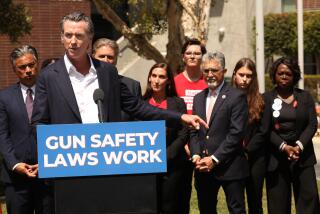Gun control backers consider strategy after Senate defeat
WASHINGTON — Supporters of stricter gun laws have organization, money and — after the Senate blocked an expansion of background-check requirements — fury.
What they don’t have is a clear path to changing the political arithmetic of the U.S. Congress.
None of next year’s Senate races offers a good opportunity to replace a senator who backs gun rights with one who supports tougher laws.
Three senators who voted against expanding background checks face tough elections next year. All are Democrats from rural states that have strong gun-rights traditions: Sens. Mark Begich of Alaska, Mark Pryor of Arkansas and Max Baucus of Montana. If they lose, their replacements almost certainly would be pro-gun Republicans.
To find opportunities to switch a vote by defeating an incumbent senator, gun-control supporters may have to wait until 2016. Several Republican gun rights supporters face reelection that year in states where gun control has strong voter appeal; none fitting that description is on the ballot in 2014.
That electoral map belies some of the optimism for a fast turnaround that gun control supporters expressed after Wednesday’s vote.
“Things change quickly here in Washington,” said Sen. Charles E. Schumer (D-N.Y.). “They’ve changed for gay marriage. They’re changing for immigration. And they will change for gun safety sooner than you think.”
Schumer, however, has predicted such change before. “It will never be the same again. The vise lock that the NRA has had on the Senate and the House is broken,” he once declared. That was in May 1999, after the Senate voted to close some gaps in the background-check law in response to the shootings a few weeks earlier at Columbine High School in Littleton, Colo. The measure failed in the House a month later.
The quickest cause of change might not be electoral defeats, but another shooting that shocks Americans.
“Next time a mass shooting happens — and if history is any guide, it will happen several times before November 2014 — every senator who voted against reform will be asked how they’re feeling that morning,” said Mark Glaze, executive director of Mayors Against Illegal Guns, the group co-founded by New York Mayor Michael R. Bloomberg that has provided much of the money behind gun control campaigns in the last year.
For now, the frustration bred by repeated defeats has helped generate a fissure in the alliance between advocacy groups and the Democratic leadership. Democrats have aimed to cast Wednesday’s failure in partisan terms. President Obama did so in his speech just after the Senate vote, in which he cited polls showing that 90% of Americans support the idea of requiring all gun buyers to go through background checks.
“A few minutes ago, 90% of Democrats in the Senate just voted for that idea. But it’s not going to happen because 90% of Republicans in the Senate just voted against that idea,” he said.
Outside groups, by contrast, directed their ire across party lines on Thursday.
The most striking example came from Obama’s own campaign operation, Organizing for Action, which announced it would mobilize supporters against both Democrats and Republicans who opposed the background-check plan.
“What is happening right now is the reason that OFA needs to be here: to harness the energy and determination of people,” said the group’s director, Jon Carson. “We need to show that the 90% on our side have staying power.”
Similarly, the mayors group quickly posted on Twitter a graphic resembling a wanted poster featuring the four Democrats who voted no: Pryor, Baucus, Begich and Heidi Heitkamp of North Dakota. The title: “Meet the Soft on Crime Caucus.”
For Democrats who bucked their party’s stance on gun control, the biggest impact will probably be on their fundraising. Many large Democratic donors strongly support new gun laws.
On the other hand, in conservative states, being opposed by Obama’s group and Bloomberg might help them, some political operatives said.
“Obama’s OFA attacking Pryor, Baucus & Begich should count as an in-kind contribution. Gives vulnerable [Democrats] a gift,” Brad Dayspring, communications director for the National Republican Senatorial Committee, tweeted.
Pryor discounted political pressure from the left.
“I can’t do anything about that,” he said. “That’s one of the problems in politics in America today, is that everything’s a litmus test — a purity test.”
Until recently, gun issues divided both parties.
“Five years ago, Democrats were given by leadership a free pass to vote however they wanted” on guns, said Arkadi Gerney, a gun policy expert at the Center for American Progress.
Now, however, lines have hardened. Every Democrat from a state that Obama carried, either in 2008 or 2012, voted in favor of expanded background checks. On the other side of the aisle, only three Republicans joined Sen. Patrick J. Toomey (R-Pa.) to support the compromise he negotiated with Sen. Joe Manchin III (D-W.Va.). They were Mark Kirk of Illinois, John McCain of Arizona and Susan Collins of Maine.
Party polarization has become even more important because of the Senate’s recent pattern of requiring 60 votes for almost all controversial measures. On the gun debate, Senate Majority Leader Harry Reid (D-Nev.) and his Republican counterpart, Sen. Mitch McConnell (R-Ky.), negotiated the 60-vote threshold in part because each side had a measure it wanted to block.
McConnell hoped to stop the background-check compromise. Reid wanted to block an amendment backed by the National Rifle Assn. that would have allowed people with permits to carry concealed weapons to do so in any state, not just their own. That would have overridden the laws in many states that strictly limit concealed-carry permits or, in the case of Illinois, ban them entirely. Both won a majority of senators but fell short of 60 votes.
Even though both sides had agreed to the plan, gun control supporters complained bitterly about it afterward. Christopher S. Murphy, the newly elected Democratic senator from Connecticut, said he dreaded having to explain to Newtown, Conn., families “that we have a broken process that doesn’t allow the majority to prevail.”
The Senate appears, for now, to have finished its work on this issue. Thursday afternoon, Reid took a procedural step to table the gun bill while vowing to revive it in the future.
“Make no mistake, this debate is not over. In fact, this fight is just beginning,” Reid said. “I’ve spoken with the president. He and I agree that the best way to keep working toward passing a background check bill is to hit a pause and freeze the background-check bill where it is. … This will allow senators to keep negotiating.”
Manchin said he would continue trying to pass a bill, promising to work with senators who voted against it to find out what changes might get them to switch their positions.
He may have lost his chief Republican partner, however. Toomey told reporters at the Capitol on Thursday that it was “not obvious to [him] about what alternative path forward there is.”
“I gave this my best shot,” he said. “I’ll be happy to discuss this with Sen. Manchin. But we had a vote yesterday.”
Manchin responded: “I assume that we have ownership whether you like it or not.”
Times staff writer Matea Gold contributed to this report.
More to Read
Start your day right
Sign up for Essential California for news, features and recommendations from the L.A. Times and beyond in your inbox six days a week.
You may occasionally receive promotional content from the Los Angeles Times.








